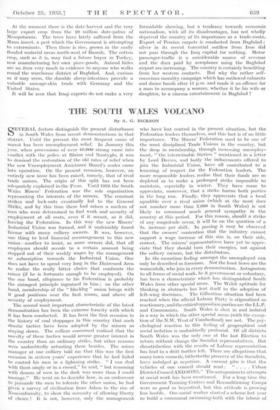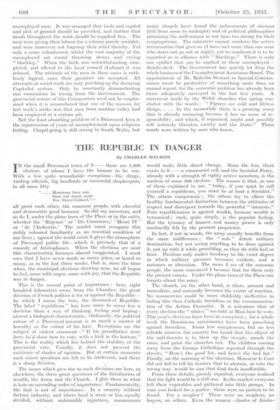THE SOUTH WALES VOLCANO
By A. G. DICKSON EVERAL factors distinguish the present disturbance S hi South Wales from recent demonstrations in that district. Until the present the most frequent cause of unrest has been unemployment relief. In January this year, when processions of over 40,000 strong came into conflict with the police at Blaina and Nantyglo, it was to 'demand the restoration of the old rates of relief when the new Uneinployment AsSistance Board's scales came into Operation. On the present occasion, however, an entirely new issue has been raised, namely, that of rival trade Unions. The origin of this split has not been adequately explained in the Press. Until 1926 the South WaleS Miners' Federation was the sole organisation representing the interests of the miners. The constant strikes and lock-outs eventually led to the General Strike, and by this time there had arisen a nucleus of 'men 'Who were determined to find work and security of emplOment- at all costs, even if it meant, as it did, leaving the Federation. In this way the new Miners' Industrial Union was formed, and it undeniably found favour with many colliery owners. It was, however, one thing to lend financial encouragement to this new iiiiion---another to insist, as some owners did, that all employees should accede to a certain amount being stopped out of their weekly wages by the management as subscription towards the Industrial Union. One does not have to spend very long in the Distressed Area to realise the really bitter choice that confronts the miner (if he is fortunate enough to be employed). On the one land, allegiance to his Federation is probably the strongest principle ingrained in him ; on the other ,hand, membership of the " blackleg " union brings with it good positions near the best seams, and above all security of employment.
The second most important characteristic of the latest demonstration has been the extreme ferocity 'with which it has been conducted. It has been the first occasion in the history of coal stoppages in this country that such drastic tactics have been adopted by the miners as staying down. The colliers concerned realised that the novelty of these tactics would arouse greater interest in the country than an ordinary strike, but other reasons were undoubtedly actuating them besides. The mines manager at one colliery told me that this was the first occasion in sixteen years' experience that he had failed to control his men in a lightning strike. I can deal with them singly or in a crowd," he said, " but reasoning 'with dozens of men in the dark was more than I could irianage." He went on to describe how, in an endeavour t( Persuade the men to' tolerate the other union, he had ki:ven a stirvey of civilisation from Adam to the rise of NencOnformity, to show the necessity of allowing liberty of choice 1 It is not, however, only the management who have lost control in the present situation, but the Federation leaders themselves, and this fact is of .no little importance. The Miners' Federation used to' be one of the most disciplined Trade Unions in the country, but the drop in membership, through increasing unemploy- ment, " the interminable friction " mentioned in a letter by Lord Davies, and lastly the inducements offered to join the Industrial 'Union, haVe all contributed to a lessening of respect for the Federation leaders. The more responsible leaders realise that their funds are so depleted as to make a prolonged strike impossible to maintain, especially in winter. They have come to appreciate, moreover, that a strike harms both parties in the long run. Finally, they appreciate that a local squabble over a rival' union (which at the most does not number' more than 2,000 in South 'Wales) is' not likely 'to command much general sympathy in the country at this period. For this reason, should a strike of any magnitude occur, it will be on the question. of a 2s. increase per shift. In passing it may be observed that the owners' contention that the industry cannot 'support a wage increase of this size is, on their side, correct. The miners' representatives have yet to appre- ciate that they should turn their energies, not against the colliery owners, but the distributors. In the meantime feeling amongst the unemployed can only be described as ferocious. Not the least fierce are the womenfolk, who join in every demonstration. Antagonism 'to all forms of social work, be it government or voluntary, has been a characteristic which has distinguished South Wales from other Special areas. The Welsh aptitude for i thinking in abstracts has lent itself to the adoption of left-wing doctrines. The Gilbertian situation had been reached when the official Labour Party is stigmatised as reactionary, and the critical opposition parties are the I.L.P. and Communists. South Wales is shut in and isolated in a way in which the other special areas (with the excep- tion of the N.W. West of Cumberland) are not. The psy- chological reaction to this feeling of geographical and social isolation is undoubtedly profound. Of all districts South Wales was the only one at the last Election to return without change the Socialist representatives. But dissatisfaction with the results of Labour representation has lead to a drift further left. There are allegations that many town councils, hitherto the preserve of the Socialists, have indulged in nepotism. A current gibe is that the vehicles of one 'council should read : " . . . . Urban District Council AND SONS." The antagonism to attempts at social work ha's been mentioned. For a long time the Government Training Centres and Reconditioning Camps were as good as boycotted, but this attitude is growing leSs hostile. One social worker started a scheme last year to build a communal swimming-bath with the labour of unemployed men. It was arranged that tools and capital and plot of ground should be provided, and further that meals throughout the work should be supplied free. The men were giving their labour for a scheme purely socialist, and were moreover not forgoing their relief thereby. Yet only a score volunteered, whilst the vast majority of the unemployed sat round throwing stones and crying " blackleg." When the bath was notwithstanding com- pleted, and offered to the local council (Labour) it was refused. The attitude of the men in these cases is ruth- lessly logical, once their premises are accepted. All attempts at social work are only patching up the decaying Capitalist system. Only by constantly demonstrating can concessions be wrung from the Government. The provincial nature of this Communism need not be empha- sised when it is remembered that one of the reasons for last week's strike was that men from another valley had been employed at a certain pit.
Not the least absorbing problem of a Distressed Area is the repercussion of years of unemployment upon religious feeling. Chapcl-going is still strong in South Wales, but many chapels have found the inducements of cinemas (full from noon to midnight) and of political philosophies promising the millennium in our time too strong for their congregations. The ministers cannot condone the active terrorisation that goes on (I have met more than one man who dares not go out at night), yet to condemn it is to be regarded as in alliance with " blacklegs." There is only one epithet that can be applied to these unemployed— disinherited. The Government has quietly let drop the whole business of the Unemployment Assistance Board. The appointment of Mr. Malcolm Stewart as Special Commis- sioner must be productive of something: more than an annual report, for the economic problem has already been twice adequately surveyed in the last five years. A statement made by the Welsh churches this spring con- cluded with the words : " Figures are cold and lifeless things. . . In the meanwhile there is a growing army that is already menacing because it has no sense of re- sponsibility, and which, if organised, might and possibly will seriously threaten society and the State." Those words were written by men who know.



























































 Previous page
Previous page